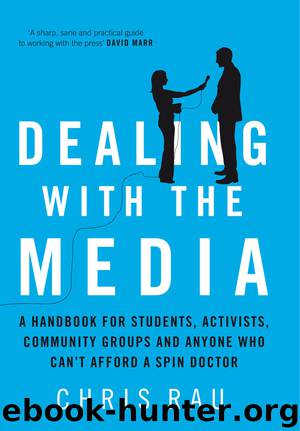Dealing with the Media by Chris Rau

Author:Chris Rau
Language: eng
Format: epub
ISBN: 9781742240053
Publisher: University of New South Wales Press
Published: 2010-09-07T16:00:00+00:00
3
Broadcast media
The importance of communication skills
The key for anyone appearing on radio or television is how they use their voice. Listen to any successful broadcaster and you’ll notice that their voice is usually in the deeper range, measured, thoughtful, free of verbal clutter, and that it emphasises downward inflections rather than upward ones. Shrill, nasal and whiny voices are rare in broadcast and usually put the listener off. If you’re going to appear on radio or television, get out your list of written points and record yourself before going on air. Do a little audio rehearsal.
This always comes as a shock for the uninitiated, because we hear our own voice differently than others do. The way our own voice vibrates through the bones of the ear canal and the skull creates a distorting effect when we hear ourselves speak. The listener three feet away doesn’t hear this, so their perception of your voice is quite unlike yours.
If you do a rehearsal, you can pick up and rein in speech patterns which don’t work: mumbling, speaking too quickly and tripping over your words, verbal tics like ‘you know’ and the teenage ‘like’. You’ll soon hear what doesn’t work and change these habits. It’s better to fix this up when you’re the only listener. It’s a lot more embarrassing to hear repeated ‘you knows’, ‘ums’ and upward inflections after something’s gone to air. If it makes you cringe, chances are it’s made the listener cringe too. Your focus is to get a message across, not to detract from it with awkward speech mannerisms.
Speak confidently, clearly and thoughtfully. Don’t be afraid to say: ‘I don’t know’, if you don’t know the answer to a question. It sounds a lot better than stumbling through an unconvincing response. If you’re not sure about something, say so and move on to something you are sure about. The reason you’re appearing on air is presumably because you know what you’re talking about. If you don’t, decline the interview. Pass the interviewer on to a colleague or contact who might be better versed in the topic, or who may simply be more articulate.
The veteran broadcasters interviewed for this book all stressed the importance of short, punchy, pithy quotes. A short, clear, direct sentence will always get a run before a sentence full of extraneous phrases and qualifiers. They say people’s attention spans have now shortened to the degree that the old 30-second grab is now considered long and a seven-second grab is preferable. It’s better to say: ‘the government’s been inept, lazy and uncaring about the homeless’ instead of ‘in this instance, it might have been better if the government had taken more care in its policy-making and platforms in regard to the number of homeless’. Time aside, the meaning of the latter sentence becomes lost in verbiage, to the detriment of both yourself and the listener. Don’t say ‘in a two-week period’ when you mean ‘two weeks’ or ‘on a daily basis’ when you mean ‘daily’.
Download
This site does not store any files on its server. We only index and link to content provided by other sites. Please contact the content providers to delete copyright contents if any and email us, we'll remove relevant links or contents immediately.
Asking the Right Questions: A Guide to Critical Thinking by M. Neil Browne & Stuart M. Keeley(5776)
Autoboyography by Christina Lauren(5236)
Eat That Frog! by Brian Tracy(4542)
Dialogue by Robert McKee(4405)
Sticky Fingers by Joe Hagan(4202)
Journeys Out of the Body by Robert Monroe(3625)
Annapurna by Maurice Herzog(3471)
Full Circle by Michael Palin(3450)
Schaum's Quick Guide to Writing Great Short Stories by Margaret Lucke(3381)
Elements of Style 2017 by Richard De A'Morelli(3350)
The Art of Dramatic Writing: Its Basis in the Creative Interpretation of Human Motives by Egri Lajos(3069)
Atlas Obscura by Joshua Foer(2963)
Why I Write by George Orwell(2955)
The Fight by Norman Mailer(2943)
The Diviners by Libba Bray(2939)
In Patagonia by Bruce Chatwin(2932)
The Mental Game of Writing: How to Overcome Obstacles, Stay Creative and Productive, and Free Your Mind for Success by James Scott Bell(2909)
Venice by Jan Morris(2575)
The Elements of Style by William Strunk and E. B. White(2475)
